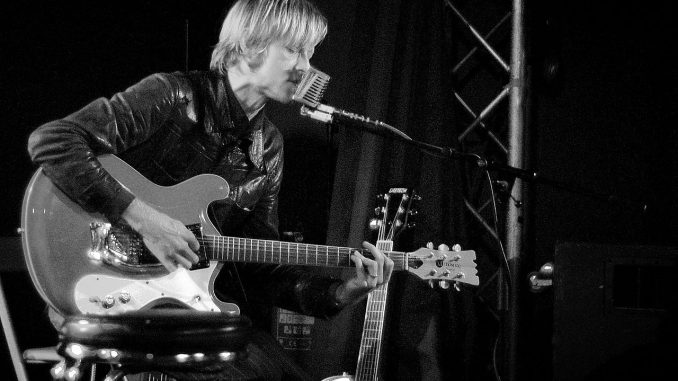
The ‘Whatever Happened To…’ series has always aimed to be eclectic in its selections, so it’s great to welcome back regular contributor, Tim Martin, with this look at a band who always followed their own, very distinctive path.
Of the many bands that have come and gone since the early 90s 16 Horsepower had one of the more individual sounds. Often described as Gothic Country or Gothic Americana, they were closer in spirit, in many ways, to some of the darker bits of alternative rock. Religious imagery played a large part in their songs and frequent subjects were loss, conflict, and guilt. Musically they drew partly from Appalachian acoustic music, although they saw themselves as an electric rock band first and foremost. Leader and writer David Eugene Edwards used banjo, concertina, hurdy-gurdy, and bandoneon (a type of accordion) to add colour to his songs. Cello and fiddle were other untypical Americana instruments they employed. Edwards vocal delivery often sounded desperate bordering on the hysterical.
Edwards was joined for most of the band’s career by the rhythm section of Jean-Yves Tola, and Pascal Humbert, with other members coming and going over the course of the band’s ten-year recording career which ended with their breakup due to “mostly political and spiritual” differences in 2005. The connection to the alternative rock world was highlighted by their choice of John Parish to produce their second album “Low Estate”. This was based on his work with PJ Harvey and specifically “Dance Hall at Louse Point” the first album where he officially shared the artist credit with Harvey. Parish’s signature use of found objects as percussion (he often used a ploughshare in his days on the local Bristol music scene) crops up across the album which has a dense sound that is light years away from many other Americana albums released in 1997.
Many of the songs on “Low Estate” actually predated their first full-length album, “Sackcloth ‘n’ Ashes”, which may explain the three-year wait for “Secret South”. Extensive touring and new material had led to a rethink of the band’s direction and much of the more frenetic “rock” feel had been replaced by a more considered approach. The wash of sound that Parish had encouraged on “Low Estate” was still present in the electric guitar sound and supplemented by strings and choral vocals. Listen to ‘Splinters’ and ‘Poor Mouth’ to hear the change most effectively.
A cancelled tour in 2001 fed rumours of conflict within the ranks and by the time of their final studio album “Folklore” in 2002 they were relying on traditional compositions, with only four original songs present. The retreat from rock music was largely complete with this album, as the title suggests. “Olden”, a compilation of previously unreleased versions of early material recorded in 1993 and 94 was released in 2003 and showed that the roots of their evolution beyond rock music were in place this early in their career. Comparing the version of ‘Coal Black Horses’ here with the one on “Low Estate” shows that rock music was not their default position.
16 Horsepower are a key Americana group because they added the darkness that lies in some aspects of American literature, art and filmmaking into their music. Bringing the influence of bands like Joy Division to Appalachian folk and traditional bluegrass gave them a unique sound. They may be gone but they contributed something unique to Americana music and deserve renewed attention because of that.
https://www.youtube.com/watch?v=hJNxPRK-WTg



Hey, that’s funny. First a little story about Glitterhouse a few days ago, now 16 HP. I was the founder at that time owner of Glitterhouse Records and the gap between the first two albums and Secret South probably resulted in them not having a label. They were dropped by A&M at the time and I wrote them a real letter to Denver starting with “IT’s probably a long shot, but…”. So I asked for a bank loan to pay the advance and we released all the further albums.
Pascal Humbert released two really nice abums under the name of Lilium which also came out on Glitterhouse. David Eugene continues to record and release as Wovenhand, as you might kknow. A new album is scheduled.
16 HP’s amanger at the time was Wayner Jessen, who also managed Nick Cave. An interesting chap who is surely missed.
Best regards Reinhard Holstein